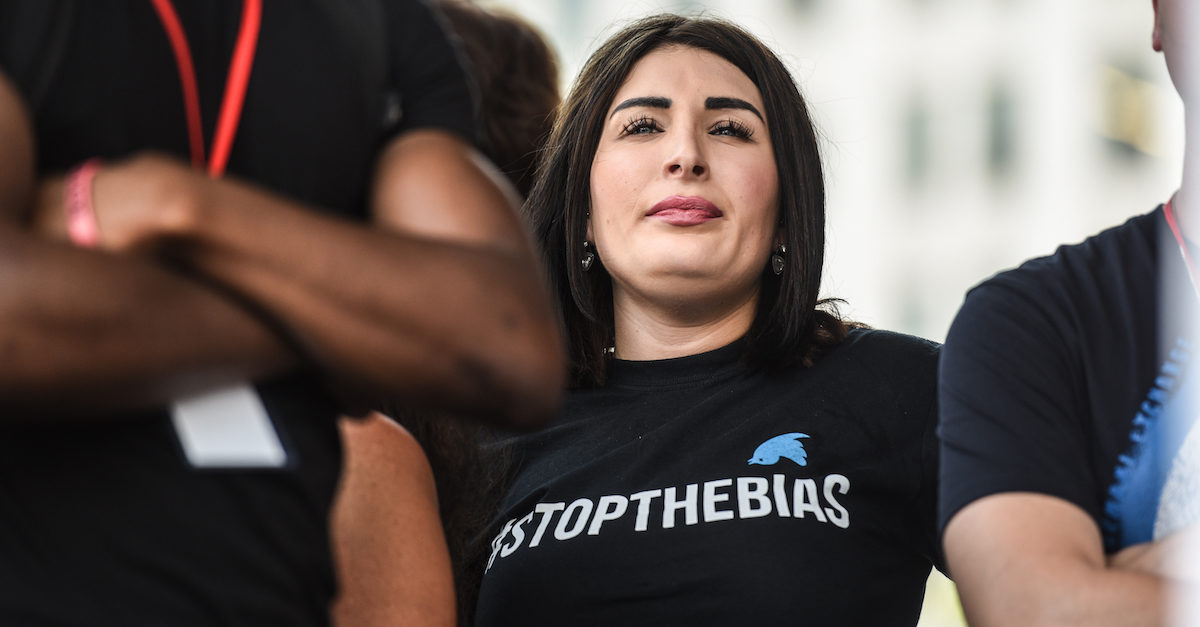
A federal magistrate judge in Florida ordered far-right conspiracy theorist Laura Loomer and her company Illoominate Media to pay a Muslim civil rights advocacy group nearly $125,000 in attorney’s fees and costs stemming from a lawsuit claiming the group colluded with Twitter to have her banned from the social media platform.
After she was permanently suspended from Twitter in 2018 due to years of anti-Muslim posts, Loomer sued the Florida chapter of the Council on American-Islamic Relations (CAIR), claiming the group violated her First Amendment rights by conspiring with the social media platform to silence her views. Loomer also alleged the group’s conduct constituted tortious interference with business relationships due to a “reasonable expectation of economic gain in the form of revenue that they would obtain from Ms. Loomer’s use of Twitter.”
Before the case was dismissed by the district court, CAIR made a written offer of judgment to Loomer, but the court said there was “no evidence before the Court the Plaintiffs accepted this offer.” Here’s what Florida law has to say about an “offer of judgment” that is not accepted:
768.79 Offer of judgment and demand for judgment
(1) In any civil action for damages filed in the courts of this state, if a defendant files an offer of judgment which is not accepted by the plaintiff within 30 days, the defendant shall be entitled to recover reasonable costs and attorney’s fees incurred by her or him or on the defendant’s behalf pursuant to a policy of liability insurance or other contract from the date of filing of the offer if the judgment is one of no liability or the judgment obtained by the plaintiff is at least 25 percent less than such offer, and the court shall set off such costs and attorney’s fees against the award. Where such costs and attorney’s fees total more than the judgment, the court shall enter judgment for the defendant against the plaintiff for the amount of the costs and fees, less the amount of the plaintiff’s award. If a plaintiff files a demand for judgment which is not accepted by the defendant within 30 days and the plaintiff recovers a judgment in an amount at least 25 percent greater than the offer, she or he shall be entitled to recover reasonable costs and attorney’s fees incurred from the date of the filing of the demand. If rejected, neither an offer nor demand is admissible in subsequent litigation, except for pursuing the penalties of this section.
(2) The making of an offer of settlement which is not accepted does not preclude the making of a subsequent offer. An offer must:
(a) Be in writing and state that it is being made pursuant to this section.
(b) Name the party making it and the party to whom it is being made.
(c) State with particularity the amount offered to settle a claim for punitive damages, if any.
(d) State its total amount.[…]
(a) If a defendant serves an offer which is not accepted by the plaintiff, and if the judgment obtained by the plaintiff is at least 25 percent less than the amount of the offer, the defendant shall be awarded reasonable costs, including investigative expenses, and attorney’s fees, calculated in accordance with the guidelines promulgated by the Supreme Court, incurred from the date the offer was served, and the court shall set off such costs in attorney’s fees against the award. When such costs and attorney’s fees total more than the amount of the judgment, the court shall enter judgment for the defendant against the plaintiff for the amount of the costs and fees, less the amount of the award to the plaintiff.
“Instead, Plaintiffs opted to litigate the CAIR Defendants’ Motion to Dismiss,” U.S. Magistrate Judge Bruce E. Reinhart wrote in Wednesday’s ruling.
The court ultimately found that Loomer had no business relationship with Twitter and therefore couldn’t sue for tortious interference.
“[E]ven accepting as true Plaintiffs’ proposition that Defendant reported Loomer’s account and convinced Twitter to ban Loomer, doing so does not create a cause of action for tortious interference with a business relationship,” the court wrote in dismissing the case in 2019. “Plaintiffs’ suggestion that the mere reporting of a Twitter user—however insistent such reporting may be—is sufficient to constitute tortious interference in a business relationship between Twitter and the targeted user is, to put it mildly, nonsensical.”
Following the dismissal, Loomer appealed the ruling to the U.S. Court of Appeals for the Eleventh Circuit which affirmed the lower court’s ruling.
CAIR filed a motion for attorneys’ fees and costs following the appellate court’s ruling which the court granted in most parts, with exceptions for the cost of traveling from Washington, D.C. to Florida (because CAIR did not show it lacked counsel in the area) and the cost of expert witnesses.
In total, the court held that Loomer owed $123,761.65 to CAIR and its Florida chapter over the litigation, plus $661.72 in costs.
Read the full ruling below.
[image via Stephanie Keith/Getty Images]